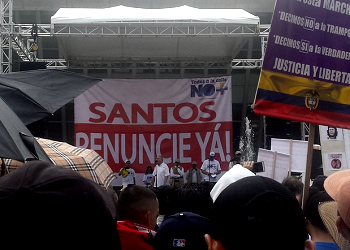As Colombia works towards implementing an ambitious peace deal and fighting new and old criminal groups, extreme levels of corruption within its own government are an often overlooked but crucial threat to battling poverty, drugs and violence during this historic window of opportunity for change.
Corruption in Colombia may be worth as much as $14 billion, Comptroller General Edgardo Maya Villazón announced at a recent anti-corruption forum organized by El Tiempo (see video below).
“The issue of corruption delegitimizes democracy … and has been estimated at 30 to 40 million pesos,” or about $10 to 14 billion, Maya Villazón said, without specifying a time period for the estimate.
Maya Villazón added that the two government anti-graft bodies, the Comptroller General’s Office and the Inspector General’s Office, along with the Attorney General’s Office “are not sufficient” in fighting corruption, for which there had to be a “commitment from the state and a commitment from society.”
On April 1, former president and current Senator Álvaro Uribe called a march against corruption calling for the removal of current President Juan Manuel Santos. The march was attended by prominent opposition activists, including Jhon Jairo Velásquez, alias “Popeye,” a former hitman for Pablo Escobar’s Medellín Cartel.

Comptroller General Edgardo Maya Villazón speaking at an anti-corruption forum in April 2017.
InSight Crime Analysis
Colombia’s headlines have recently been filled with the national reverberations of the multi-country corruption scandal surrounding Brazilian construction conglomerate Odebrecht. In recent weeks, allegations involving the far-reaching bribery network created by the company have tarnished the 2014 presidential campaigns of current head of state Santos as well as his runner-up Óscar Iván Zuluaga, whose run for office was backed by Senator Uribe.
This is but the latest illustration of the Colombian state’s erosion by criminal schemes at all levels, which have long benefitted organized crime groups and elites alike. Now, fighting this affliction will be of renewed importance as the government implements a seminal peace deal with the Revolutionary Armed Forces of Colombia (Fuerzas Armadas Revolucionarias de Colombia – FARC). As part of the agreement, the state has promised to occupy the power vacuum in regions formerly controlled by the insurgency, as well as to carry out an ambitious rural development campaign aimed at weakening criminal economies in the countryside.
But many fear that the billions of dollars in international aid that will support the peace deal risk being squandered by the typical corruption networks formed by businessmen, politicians, contractors and criminal groups. Indeed, FARC members demobilizing in rural camps have claimed that the government has completed little to none of the preparation for the camps while food stuffs are exorbitantly priced, allegedly as a result of corrupt contracting schemes.

A February 2017 shot of an empty plot of land where a FARC demobilization camp should have been set up, supposedly by the government.
Whether this is true or not, it reflects — and fuels — much of the public’s distrust that government officials will prioritize the country’s poorest. And this skepticism could reduce the incentive for citizens to embrace future government initiatives, such as a vital projects to substitute coca cultivations with legal crops.
Corruption of local authorities also strengthens criminal groups’ ability to operate within a community and, at times, supplant legitimate governance. As criminal groups move in to former FARC strongholds, this reality will continue to undermine the state’s ability to recover such territories and tens of thousands of families involved in their illegal economies.
Decisive action and the empowerment of the Colombian public, in the form of citizen oversight bodies, for instance, may offer some solutions.
As Comptroller General Maya Villazón stated at the forum: the population must “rise up against the misuse of public funds … tumble the pillars so that the entire [system] collapses and something new can be built.”

